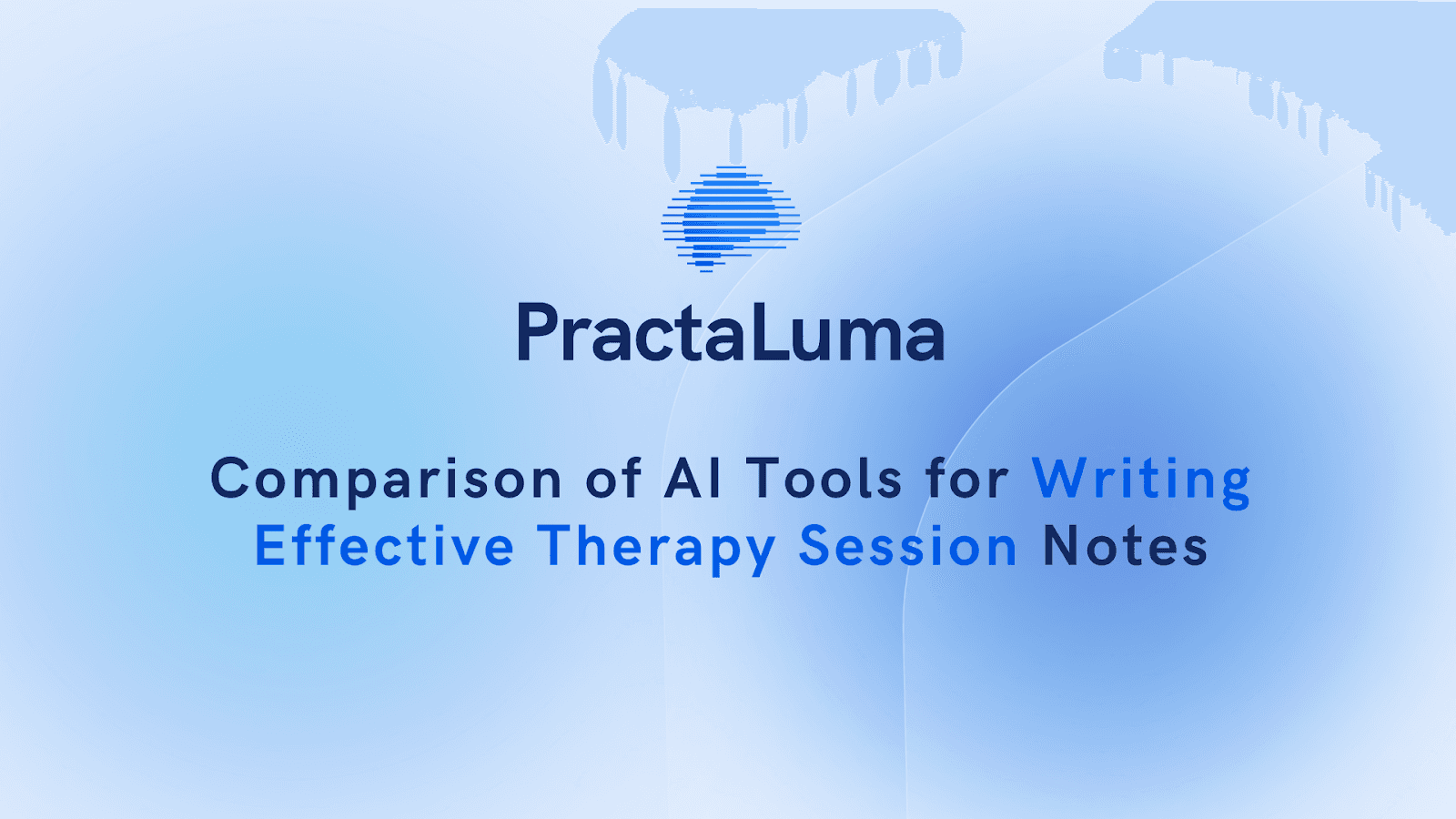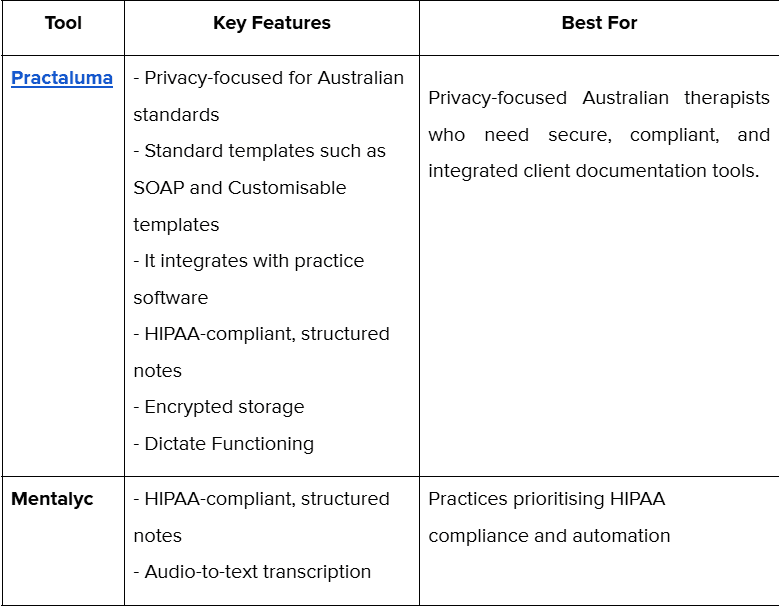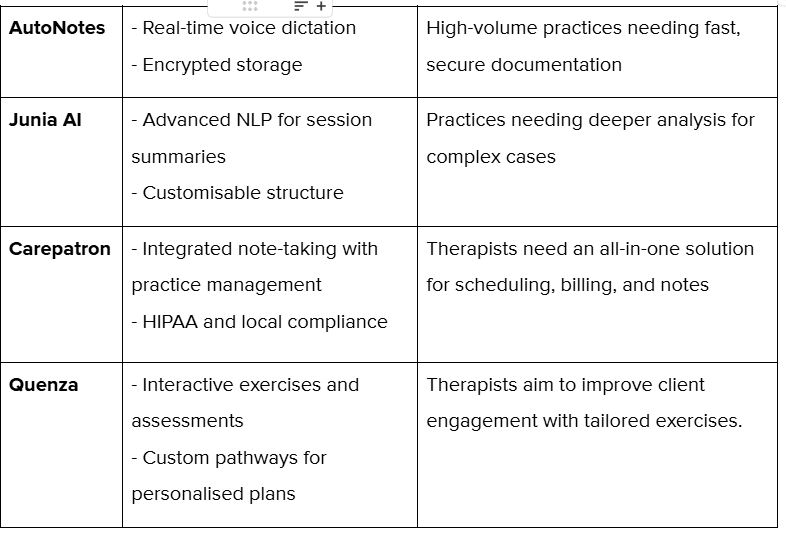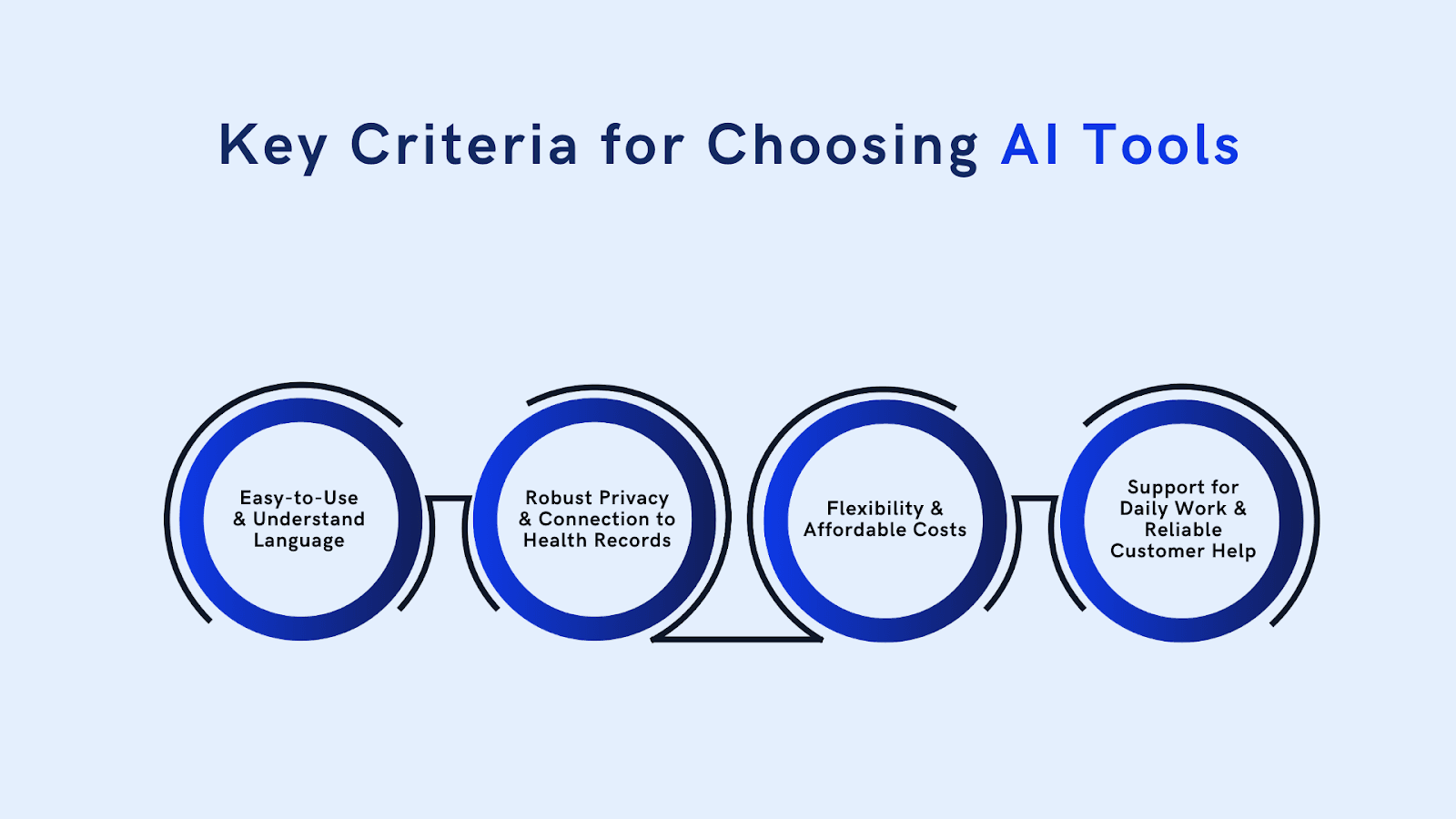
19 March 2025
Comparison of AI Tools for Writing Effective Therapy Session Notes
Do you feel buried in paperwork, spending valuable time on notes and admin rather than with your clients?
According to NCBI, health professionals report that administrative tasks can consume up to 50% of their day, reducing time for patient care. With AI-powered tools, you can streamline documentation, freeing up hours to focus on what matters most: your clients. Let’s explore the top AI tools for therapy notes, but first, let's understand why therapy notes matter.
Why Do Therapy Notes Matter?
In Australia, therapy session notes are essential for legal compliance with the Privacy Act 1988 and AHPRA guidelines. These notes track client progress and protect therapists and clients in audits or legal situations.
With the rising demand for mental health services—one of Australia’s fastest-growing sectors—maintaining accurate and efficient documentation has become essential. Yet, extensive note-taking can lead to therapist burnout.
AI tools are now transforming this process, using Natural Language Processing (NLP) to summarise sessions, highlight key themes, and capture real-time emotional shifts.
Imagine software that organises critical session points automatically, letting you focus more on your clients. With AI-driven documentation, therapists can reduce administrative load, save time, and enhance care quality.
Ready to simplify your practice? Let’s explore how these AI tools make documentation faster, more efficient, and compliant with Australian standards.
Top 6 AI Tools for Therapy Notes
As AI becomes integral to therapy practices, specific tools emerge as leaders in note-taking and documentation, helping therapists save time, improve accuracy, and ensure compliance.
Here’s a look at some of the most popular AI tools available for therapy notes:
1. Practaluma: Comprehensive Note-Taking with Privacy-Centric Design
Practaluma is a top choice for therapists seeking streamlined documentation on privacy and compliance. It provides secure, AI-driven note generation that captures key session details while adhering to Australian and global privacy standards. Its user-friendly platform integrates with practice management systems, offering automated summaries, customisable templates, and encrypted storage for data security.
Why Practaluma?
- Privacy Compliance: Built to meet both Australian and international data protection standards (APP, HIPAA, GDPR, ISO270001, SOC2), ensuring confidentiality.
- Automated Summaries: Saves time by creating concise session notes.
- Report Writing: The first tool that helps practitioners draft end-to-end reports for ADHD, Autism and other mental health-related assessments.
- Seamless Integration: Works well with other practice software, calendars and all telehealth platforms, making documentation effortless.
Explore more at Practaluma’s AI Solutions.
2. Mentalyc: Automated Note Generation with HIPAA Compliance
Mentalyc automates note-taking by analysing session audio to generate structured, HIPAA-compliant notes. Mentalyc is ideal for busy practices aiming to minimise manual documentation work.
Key Features:
- Automated Notes: Transcribes and structures session insights automatically.
- HIPAA Compliance: Ensures data protection is aligned with U.S. privacy standards.
- Insightful Summaries: Captures vital themes, making it easy to track client progress.
Learn more at Mentalyc.
3. AutoNotes: Real-Time Dictation with Secure Storage
AutoNotes focuses on voice-to-text features, allowing therapists to dictate notes in real time or post-session. Its encrypted storage ensures that sensitive information remains protected, making it ideal for high-volume practices.
Key Features:
- Voice Dictation: Facilitates real-time note-taking via dictation.
- Secure Storage: Provides encrypted data handling for client privacy.
- Intuitive Interface: Simple to navigate and manage session notes.
Visit AutoNotes for more details.
4. Junia AI: Advanced Language Processing in a User-Friendly Interface
Junia AI uses advanced NLP to generate accurate, detailed notes based on session recordings. Its intuitive and adaptable interface makes it ideal for therapists who prefer quick, organised overviews of each session.
Key Features:
- Advanced NLP: Generates insightful summaries based on natural language processing.
- User-Friendly Design: Easy to adopt, making it accessible for all skill levels.
- Customisable Structure: Adapts to different therapy styles for flexible note-taking.
Discover more about Junia AI at Junia AI.
5. Carepatron: Comprehensive Note-Taking with Integrated Practice Management
Carepatron is an all-in-one solution that combines note-taking with practice management. It makes it easy for therapists to document sessions, manage schedules, and handle billing in one place. Focusing on streamlined workflows, Carepatron helps practitioners save time while ensuring high-quality client documentation.
Key Features:
- Integrated Note-Taking: Allows quick session documentation alongside scheduling and billing.
- Compliance & Privacy: Built to meet privacy regulations, including HIPAA and local standards.
- Customisable Templates: Offers templates tailored to suit various therapy styles.
Learn more about Carepatron at Carepatron.
6. Quenza: Tailored Client Documentation with Interactive Tools
Quenza offers a unique note-taking approach by combining documentation with interactive tools for client engagement. Therapists can create detailed session notes while sharing personalised exercises, assessments, and feedback with clients, making it ideal for those seeking a more holistic approach to client care.
Key Features:
- Interactive Exercises: Send customised activities and assessments directly to clients.
- Easy Documentation: Capture session notes efficiently with a user-friendly interface.
- Custom Client Pathways: Personalised treatment plans and track progress over time.
Discover more about Quenza here.
To understand the differences better, it’s essential to know the differences and similarities among these tools and which target audience they cater to. Let’s learn ahead.
Comparing Features and Benefits
Below is a comparison of the leading options, with each tool’s strengths and the types of practices they best support.


Click here to schedule a demo session today with Practaluma's AI for Therapy notes.
In short, each tool listed above offers unique strengths, but their best impact comes from using them in the proper context. Let’s explore the critical criteria for choosing the best AI tool for therapy notes.
Key Criteria for Choosing AI Tools

When choosing an AI tool for therapy notes, it’s essential to focus on features that make the tool easy to use, secure, flexible, and helpful in daily work. Here’s a simple breakdown of what to look for and how each part can benefit therapists.
1. Easy-to-Use and Understand Language
One of the most important things to look for in an AI tool is its ease of use. Therapists need something that fits smoothly into their work without a long learning period. Natural Language Processing (NLP) tools are beneficial because they understand everyday speech or text and turn it into organised notes.
For example, imagine a therapist with many back-to-back sessions. With NLP, they can simply talk through the main points of each session using dictation, and the AI quickly transforms these spoken notes into structured records. This way, the therapist doesn’t have to spend as much time typing between their sessions and can focus more on their clients.
2. Robust Privacy and Connection to Health Records
Keeping therapy notes private and secure is essential. Therapists must protect their client’s information, so they need tools that meet strict privacy standards, like the Privacy Act 1988 in Australia or HIPAA in the U.S. Many AI tools offer encryption (special protection that hides the information) so client details stay secure.
It would also be helpful if the AI tool could connect directly with electronic health records (EHRs), which store all of a client’s health information.
For example, a therapist working in a clinic with other providers may need to view past notes from other therapists or doctors. EHR integration allows them to see and update client records in one secure place, making providing care easier and faster.
If you’re looking for a secure tool that prioritises privacy and integrates well with practice management systems, check out one of the best AI tools for therapy notes.
3. Flexibility and Affordable Costs
Therapists may have different note-taking styles, such as SOAP (a specific way of organising notes into four parts: Subjective, Objective, Assessment, and Plan) or other formats. A good AI tool should allow them to adjust or choose templates that best suit their style.
Cost is also essential, especially for small clinics or solo therapists. Finding a tool that’s affordable but still offers essential features lets therapists streamline their note-taking without high costs.
For example, a solo therapist might pick a tool that allows flexible note-taking styles and pay-as-you-go pricing, so they only pay for what they need.
4. Support for Daily Work and Reliable Customer Help
A good AI tool should make a therapist’s daily tasks more accessible, from organising notes to 5P case formulation and client follow-ups.
By handling repetitive jobs, these tools save time so therapists can focus on their clients. AI tools that can create session summaries, organise client histories, and even manage billing codes take care of time-consuming tasks.
Customer support is also crucial. If problems arise, having a quick and reliable support team can help therapists solve issues immediately.
Imagine a therapist dealing with a glitch right before a session. A tool with dependable customer support can quickly help the therapist return to work immediately.
Tips for Implementing AI in Therapy Note-Taking

Implementing AI in therapy documentation can be a game-changer, but a strategic approach is essential to make it truly effective. Here are some practical tips to help therapists get the most out of AI tools and ensure a smooth, productive transition.
- Start Small: Try AI features in specific areas, like automated summaries or voice-to-text, before adopting it across all sessions. Starting small lets therapists ease into the technology and understand what works best for their workflow.
- Customise Templates to Fit Your Style: Many AI tools offer customisable templates so that therapists can adapt note-taking formats—like SOAP notes or narrative styles—to their preferences. This flexibility makes AI tools feel like a natural extension of their documentation style.
- Double-Check for Accuracy: While AI can save time, reviewing and editing notes for accuracy is still important. Verifying the AI’s work, especially early on, helps ensure all details are captured and understood correctly.
- Stay Compliant with Privacy Laws: Carve out a few minutes to ensure AI-generated notes meet your country’s strict privacy regulations, like Australia’s Privacy Act 1988 or HIPAA in the U.S. This step ensures sensitive client information remains protected. If you’re looking for an AI tool designed with solid compliance and privacy in mind, check out the Complaint AI tool for therapy notes.
- Build in a Quick Review Routine: Make it a habit to review and finalise AI-generated notes after each session. This quick step ensures your documentation is complete and compliant, maintaining high standards without taking up much extra time.
With these tips, implementing AI becomes much smoother, helping therapists maximise automation while maintaining accuracy and privacy standards.
Conclusion
Integrating AI into therapy note-taking provides therapists with a powerful tool to improve efficiency, maintain thorough documentation, and ensure compliance—all while minimising time spent on administrative tasks. By adopting AI gradually, customising tools to align with specific practice requirements, and prioritising privacy, therapists can fully leverage the advantages these advancements offer.
Ready to streamline your documentation and focus more on what matters most—your clients? Discover how Practaluma can transform your therapy practice.